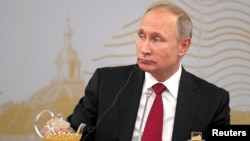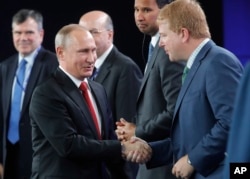For three years after Russia annexed Crimea, Washington officials quietly cautioned major U.S. firms about attending the annual St. Petersburg forum, where investors mingle with President Vladimir Putin and his lieutenants.
This year, the first forum since Donald Trump became U.S. president, such cautions were not issued, according to four people familiar with preparations for U.S. companies to attend.
Washington’s policy toward Russia is essentially unchanged under Trump, with the United States committed to maintaining sanctions on Moscow unless it complies with international demands about Ukraine.
Change in tone
But its approach this year to the St. Petersburg event — often described as Russia’s version of the Davos forum in Switzerland — reveals a change in tone, according to some people who follow U.S.-Russia trade relations.
Daniel Russell, the head of the U.S.-Russia business council, when asked if U.S. companies were feeling less pressure from the administration to stay away, said: “I think that’s right.
“Some of the companies, particularly in 2015, received calls from the U.S. government not to attend and I think that attitude has certainly changed,” he said.
The change in tone fits with promises Trump made during his election campaign to pursue friendlier ties with Russia.
Any sign of warming toward the Kremlin is highly sensitive for the White House, since Congress and the FBI are conducting inquiries into whether members of the Trump team had improper contacts with Russian officials before Trump’s inauguration.
Trump has denied doing anything wrong.
Asked about contacts with companies planning to attend the forum, a State Department spokesperson said: “We have an open dialogue with the business community, and ultimately companies are free to make their own decisions, in line with applicable laws and regulations.”
The forum in St Petersburg was in its second day Friday and there were signs of a more substantial U.S. presence than in previous years since the March 2014 annexation of Crimea.
US ambassador attends
U.S. ambassador to Russia John Tefft was at the forum, though he did not have a speaking slot. No U.S. ambassador attended in 2014, 2015 or 2016.
A spokeswoman for the U.S. embassy in Moscow said his attendance was a routine part of his ambassadorial duties.
Major U.S. companies who sent senior executives, including oil major Exxon, Boeing, Chevron and JPMorgan, were represented at a similar level to last year, but several delegates at the forum said they estimated the U.S. presence to be numerically bigger than in previous years.
“We see a much larger number of people from the U.S., Canada,” said Kirill Dmitriev, chief executive of the Russian Direct Investment Fund, a state body that works with foreign investors.
“There is a better understanding (among foreign investors) that sanctions really did not work, the Russian economy continues to grow, Russia represents an attractive market and people should work with Russia,” he told Reuters.
Russian economy growing
Several U.S. delegates said that, politics aside, they were drawn to the forum by the fact the Russian economy had returned to growth after a slowdown.
The forum is a prestige project for Putin, a native of St. Petersburg. Foreign executives typically use their presence to signal to the Kremlin their enthusiasm for investing in Russia.
In 2014, when the Ukraine crisis first started, U.S. Cabinet officials including Secretary of State John Kerry made personal calls to chief executives of U.S. firms asking them not to attend, said a former U.S. official who spoke on condition of anonymity.
The next year, senior U.S. officials below Cabinet level were charged with persuading American executives not to attend, and in 2016, U.S. officials brought up the issue in a low-level manner, the former official said.
The account of those conversations was confirmed by a second former official who served in the administration of former U.S. President Barack Obama.
The guidance in later years was not necessarily to stay away, but that executives who did attend should keep their presence low-key, said several other people familiar with the discussions.
Ian Colebourne, who is CEO for Deloitte in the Commonwealth of Independent States and sits on the U.S.-Russia business council, said he was aware of officials giving guidance to executives in previous years, but added: “I haven’t heard anything this year.”
Two other sources familiar with the preparations for U.S. companies to attend also said there had been no guidance before this year’s forum, in contrast to previous years.
Green light?
The lack of contact from the U.S. government this year is being interpreted among business executives as meaning: “You can go,” said one of the two sources.
The U.S. Chamber of Commerce did not receive any guidance from the administration about whether or not to participate in the event, a source with the Chamber said.
Still, some companies that did attend exercised caution, keeping a low profile.
The head of U.S. oil giant Exxon Mobil, Darren Woods, did not join the table of panelists at the main oil session of the forum. It was chaired by the head of Kremlin oil major Rosneft, Igor Sechin, who is on the U.S. sanctions list.
Like his predecessor as Exxon CEO Rex Tillerson, now Trump’s Secretary of State, Woods made only brief remarks from the floor in a discussion about the energy industry.
Among other U.S. companies at the forum, JPMorgan Chase & Co., sent Daniel Pinto, Chief Executive Officer of its corporate and investment business, while Boeing sent Bertrand-Marc Allen, president of its international arm.
U.S. oil major Chevron sent its vice president for business development, Jay Pryor. He was also at the forum last year. A company representative did not reply to questions about any guidance from the administration.
“Let’s say the seniority of some of the teams is more senior this year, certainly compared to some prior years and that’s a positive sign,” Deloitte’s Colebourne said of the U.S corporate presence.
Robert Dudley, chief executive of BP, a British company with substantial business in the United States, said his impression was that this year there were more representatives of U.S. companies at the forum than previously.
“That would suggest they are not feeling that kind of pressure,” to curb their presence, he said.







